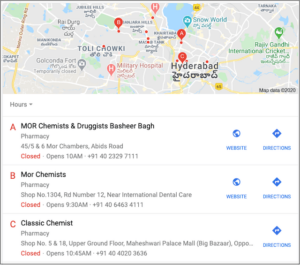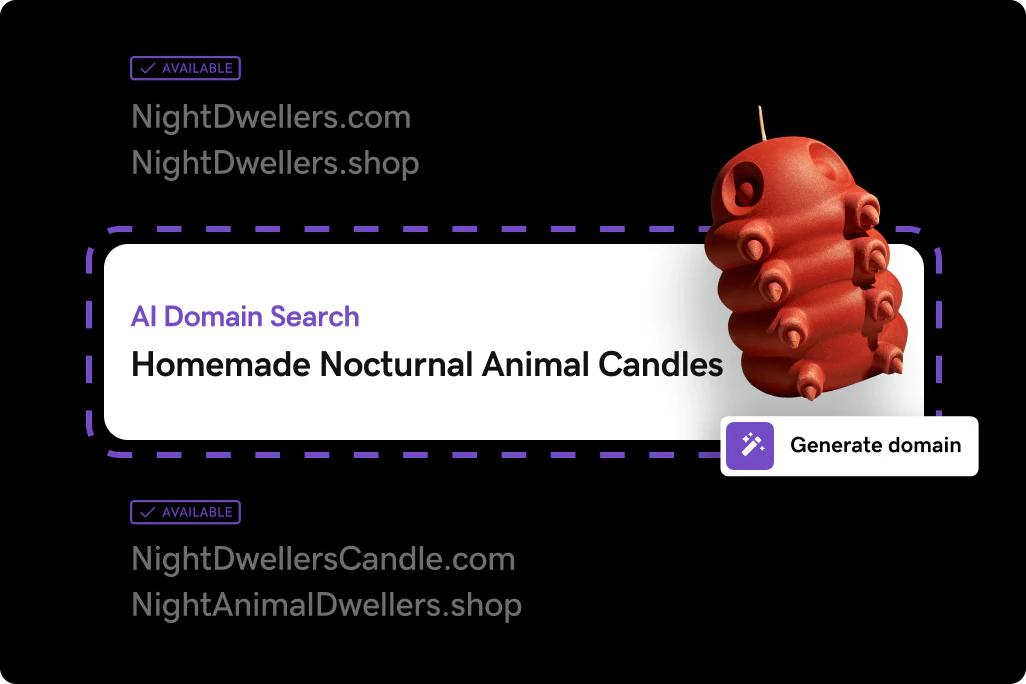Choosing a domain name is similar to choosing a company name — it requires a lot of thought and consideration.
Your domain name is your identity on the web; you want to make sure you choose a name that not only fits your business, but is also easy to find and promote.
How to choose a domain name that gets results?
Choosing a domain is one of the most important steps in starting a business, since it will serve as your web address for the life of your business.
Follow the steps below to help you pick the perfect domain name. And if you want to learn even more about domain names, check out "What is a domain name" for in-depth information.
1. Choose a domain name that is easy to type
Selecting a domain name that’s easy to type is crucial for online success. Using slang (e.g., `u` instead of `you`) or words with multiple spellings (e.g., `express` vs. `xpress`) can make it harder for customers to find your site.
2. Keep it short
If your domain name is long and complex, you risk customers mistyping or misspelling it. Short and simple is the way to go.
3. Use keywords
Incorporate keywords that describe your business and the services you offer. For example, if you’re a glass replacement business, you may want to register GlassRepair.com or GlassReplacement.com.
Include the keywords that people enter when searching for your products or services.
It helps improve your domain's rank on search engines (which increases traffic) and just makes more sense to your customers.
4. Target your geographic area

If your business is local, consider including your city or state in your domain name to make it easy for local customers to find and remember. Example: HyderabadGlassRepair.com.
Using a country-specific TLD can enhance your local SEO by signaling to search engines that your website is relevant to a particular geographic area, thereby improving your visibility in local search results. Additionally, a localized TLD helps build customer trust by demonstrating your commitment to serving the local community.
Related: Definitive guide to the .in domain name

5. Avoid numbers and hyphens
Numbers and hyphens are often misunderstood — people who hear your website address don’t know if you’re using a numeral (5) or it’s spelled out (five) or they misplace or forget the dash. If you need these in your domain, register the different variations to be safe.
6. Be memorable
There are millions of registered domain names, so having a domain that’s catchy and memorable is essential. Once you’ve come up with a name, share it with close friends to make sure it sounds appealing and makes sense to others.
Quick solution: Got a great idea for a domain? Register your domain name today and put a website out there before someone else beats you to it.
7. Research it
Make sure the name you’ve selected isn’t trademarked, copyrighted or being used by another company. It could result in a huge legal mess that could cost you a fortune, as well as your domain!
Don’t forget to research the value of your possible domain.
As the largest reseller of aftermarket domain names, GoDaddy has access to extensive data that we use to analyze millions of historical domain sales. Try out GoDaddy Domain Appraisals to help you determine the value of your domain, so you can name your business with purpose.
8. Choose a domain name extension that fits
Extensions are suffixes, such as .com or .net, at the end of web addresses. These can have specific uses, so make sure to choose one that works for your business.
The .com domain extension is far and away the most popular, but it can be tough to get a short and memorable .com domain name because it’s been around for so long.
A good option is .in, as it tells all who see it that your business located right here in India.
A bevy of new generic top-level domains — like .co, .io, .xyz, .ai, and .me domains offer a great opportunity to register short and highly relevant names. And here are some other top extensions and how they’re often used:
- .cricket : for youth leagues, pro teams and fans.
- .dev : for web developers, coders and other tech professionals.
- .green : for businesses involved in the global sustainability movement.
- .tech: Ideal for technology companies and startups.
- .store: Perfect for e-commerce and retail businesses.
- .art: Suited for artists and creative professionals.
- .design: Great for designers and creative agencies.
- .health: Tailored for healthcare providers and services.
- .edu: Suitable for educational institutions.
Other popular extensions include:
- .info: Informational sites.
- .net: Technical and internet infrastructure sites.
- .org: Non-commercial organizations and nonprofits.
- .biz: Business or commercial use, such as e-commerce sites.
Pro tip: You don’t need to build a website for every domain. Just forward additional domains to your primary website.
Editor`s note: Use GoDaddy’s promo codes to get discounts on .com domains.
9. Protect and build your brand
To protect your brand, you should purchase various domain extensions, as well as misspelled versions of your domain name. This prevents competitors from registering other versions and ensures your customers are directed to your website, even if they mistype it. Use GoDaddy’s bulk domain search tool to register multiple domains at once.
10. Buy premium domains to secure memorable and standout website names
Purchasing a premium domain can make your website stand out with a memorable and authoritative name. Find premium domains for sale, view their pricing, and choose the one that best represents your brand.
11. Search and generate domain names instantly
Our instant domain generator tool suggests available domain names as you type, accessing a vast database in less than 100ms. This AI-driven tool combines and tweaks words to create brandable domain names that are short, memorable, and relevant to your industry.
12. Explore related domain names for enhanced creativity
As you search, we provide similar available domains, including translations into other languages, synonyms, and related topics. This feature expands your creativity, allowing you to explore more ideas and find a domain name that perfectly represents your niche.
13. Use Internationalized Domain Names (IDNs)
Internationalized Domain Names (IDNs) allow users to register domain names in their native language, enhancing local brand presence. Explore over 1,600+ domain extensions to find the best fit for your global audience.
14. Choose a domain name that is flexible for future growth and business expansion
Selecting a domain name that can adapt to your business’s evolving needs is crucial for long-term success. You can choose one that best represents your brand today and accommodates future expansion into new markets or niches.
15. Act fast
Domain names sell quickly. Thankfully, many domain names are also inexpensive, so register your favorite domains as soon as possible. If you’re looking to start an online business, it’s crucial to get a good domain. If you’re having trouble finding an available name, domain registrars like GoDaddy will suggest alternate names during your domain search to help you find the perfect domain name.
Read more on the topic in our article How much does a domain name cost.
Try out our free business name generator also.
Try it now!
Frequently Asked Questions
It’s natural to have doubts if you are going to buy a domain name for the first time. That is why we have added the following FAQs to clear the picture:
What is a domain name?
The simplest explanation would be that a domain name is what someone types into the search bar to find your website.
For example, the domain name for GoDaddy is godaddy.com.
In computer terminology, it is a string of text that attaches itself or maps to a specific numeric IP address to access a website from client software. So, if you have a website, and someone asks you how to find it, what you tell them is your domain name.
How do I know whether the domain name I want is available?
You need to check the availability of the domain name. You simply need to type in your proposed domain in GoDaddy’s search bar, and you’ll immediately know if it’s available or not.
If a specific name is already taken and is not available, GoDaddy will provide a list of similar names that are available.
If you badly want a particular name that’s already been taken, you can try the GoDaddy Domain Broker Service, where GoDaddy can try to get you the domain name from the current owner for a negotiated price.
Alternatively, you can also do a WHOIS Lookup to find the registration details of the domain and try to contact the owner yourself.
How do I buy a domain name?
Once you’ve done the above steps, buying a domain name is easy. All you need to do is:
Decide what domain name extension you want. The extension is the part of the domain name that comes at the end (.in, .net, .biz, .org, .com).
After this, it’s as easy as grocery shopping. Add the domain name to the GoDaddy cart, pay, and check out. It also means your domain is now registered. You are now the sole owner of that domain!
How to choose the right domain name extension?
Most people concentrate on the domain name and don’t spend much time deciding on the domain extension. But the extension can have a tremendous impact on your business.
The domain extension can be used to denote what type of business you do, what kind of company you own, in which country your business is located, and more. So, based on the nature of your business, the industry, and the availability of the extension along with your domain name, select a Top-Level Domain (TLD).
What is TLD, and how can I benefit from it?
TLD is that part of the domain name that comes after the dot – ialso known as the domain name extension. Typically, a domain consists of TLD and second level domain (SLD).
For example, in GoDaddy.com, .com is the TLD that signifies that the website is for commercial use, and SLD is GoDaddy. The most in-demand and common TLDs are .com, .net and .org.
You can go with any TLD. However, .com is the most preferred, making sense to go with it if it’s available. Also, .com ranks high on credibility when seeking backlinks, though the other TLDs have also gained a niche identity of their own over the years. For instance, web developers often go for .net, and not-for-profit organizations prefer .org, global conglomerates like .co, and so on.
Yet another set is ccTLD or country-code TLD. This is used to represent specific geographic locations. For example, .in represents India. Some of these ccTLDs have residency restrictions - .eu representing European Union, for instance, will be available only to a resident of a country in the European Union.
But there are other ccTLDs, that can be registered by anyone – this is how .co representing Colombia is being used currently by anyone world over who wants to indicate a global conglomerate.
Is a domain registration for life, or do I have to renew it?
The duration of your domain registration is dependent on where you purchase it from and what type of purchase you’ve opted for.
Several domain name registrars let customers register domains for up to 10 years at one go. But customers mostly register domains for two to three years, preferring to renew their registration as and when needed.
With GoDaddy, it’s easy to renew the domain registration. One can either manually renew it or set up auto-renewal. In fact, GoDaddy also has web hosting and email hosting facilities that will make your business look immediately attractive as a well-packaged unit to new customers.
Can I make money investing in domain names and selling them later?
Trading in domain names, called domaining, is quite a profitable business. That’s how voice.com made 30 million dollars in 2019.
The increase in internet usage worldwide has skyrocketed the demand for short, meaningful domain names, making domaining one of the most profitable businesses in the internet real estate market.
You can simply buy a domain and sell it at a later stage, possibly pocketing a neat sum of profit. If done strategically, domain “flipping” — buying domain names intending to sell or ‘flip’ them for a profit —can earn you a decent amount of money.
What are the new domain extensions? I would like to know more about that
New domain extensions are a new set of extensions beyond the common .com, .net, etc. Some famous ones are category-based — like .fun, .space, .health, etc. If combined well with a smart domain name, it can give your web address a quirky edge in the digital world.
These new TLDs help you improve your branding, giving you domain names that are easy to remember and relate to and also help you establish a business identity online. Imagine you running an online coaching class, and you get a .guru web address.
How do I get a free domain name?
This is easy. All you have to do is buy an annual Web Hosting plan (Economy, Deluxe or Ultimate plan) or any Managed WordPress plan from GoDaddy, and you’ll automatically get a free domain.
So, when you click Add to Cart for three of GoDaddy’s four web hosting plans or any WordPress plan, ensure you choose the annual plan. Only then will you qualify for getting the free domain.
Once you go to the next step after selecting these options, you will get the option to search for the domain name you want. Opt for one using the tips in this article, and just add the domain name to your cart and checkout.
Do I need a website to have a domain name?
No, a website is not needed to buy/register a domain name. You can register a domain name and make a website later by setting up a temporary ‘coming soon’ page.
But the thing to know is, buying a domain does not automatically give a website hosting capacity. You have to buy a website hosting plan in order to make your site visible on the internet. You can then build the website as per your wish. If you keep it all with GoDaddy, they will help optimize your website’s brand value with allied services such as email.
Editor's Note: This perfect domain name post was first published on 15 May 2020 and updated on 18 March 2022 and 23 October 2025. Vagisha Arora provided updated content for this post.









